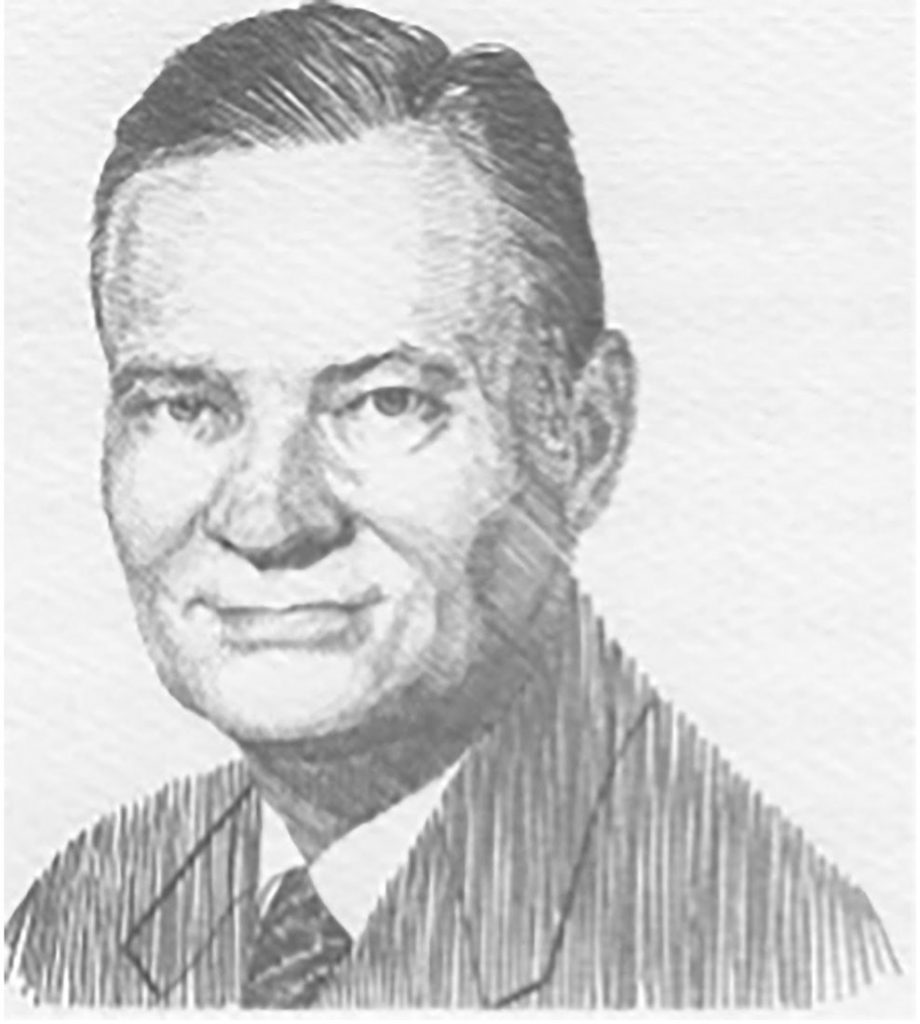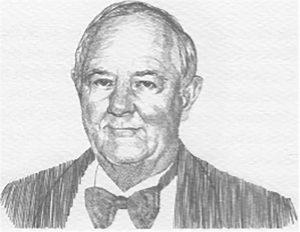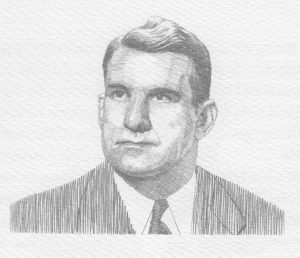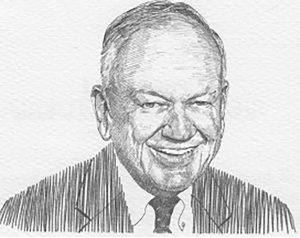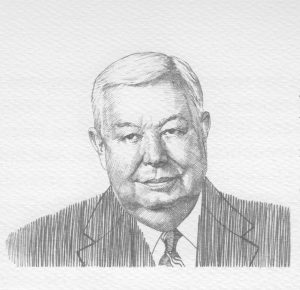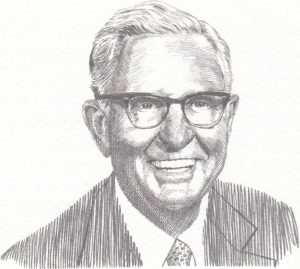When Ernest Going Williams was selected to receive The University of Alabama’s Distinguished Alumni Award, The Tuscaloosa News, in a congratulatory editorial, said Williams “joins the ranks of UA legends… ”
Indeed, his service to the University, to his community, and to humanity, in general, is legendary.
Paper company executive, University treasurer and trustee, banker, and all-around outstanding citizen, Williams’ roots go deep into the soil of the Southeast. His ancestors journeyed to Alabama from North Carolina in 1817 and played prominent roles in the development of the territory. His great-grandfather, Nicholas Gaines Augustus, was a Mississippi planter and attended The University of Alabama in the 1840s. His father was an owner of Consolidated Lumber Company, which had sawmills throughout Mississippi, Alabama, and Florida. and Mary Sanford Williams. He was named for his step-grandfather, Alfred Ernest Going, Jr. The family moved to Tuscaloosa when Ernest was five.
Williams was born in Macon, Mississippi, on September 24, 1915, the son of Augustus Gaines
Ernest Williams attended Tuscaloosa schools and graduated in 1938 from The University of Alabama with a Bachelor of Science degree in commerce and business administration. As a student, he was a member of the Excelsior and Philomathic literary societies, the Cotillion Club, Quadrangle, Jasons, and Omicron Delta Kappa. One of his greatest interests was the Kappa Alpha Fraternity, the members of which bestowed on him the title of “Boss,” which has stayed with him as he served on the National Executive Council of Kappa Alpha Order.
In 1942, shortly after the attack on Pearl Harbor and the beginning of World War II, he sought and was accepted into the Navy’s officer training program at Notre Dame and Northwestern University and was commissioned as an ensign. He served as communications and deck officer aboard the U.S.S. Kaskaskia, a fleet oiler and as a communications officer aboard the U.S.S. Severn in the South Pacific. After three years of active duty, he was released at the end of the war and returned to Tuscaloosa and a position as assistant treasurer at the University. He soon was elected treasurer and established a reputation for fairness and openness, as well as for shrewdness in financial matters. During his tenure, he negotiated several loans that were used to build student dormitories and fraternity and sorority houses. He also promoted a plan that allowed faculty members to obtain housing loans at a 5 percent fixed-rate, with no closing costs and no prepayment penalty. Many young faculty members can thank Ernest Williams for helping them finance their first home.
The 1950s proved to be eventful times for Ernest Williams. In 1951 he married Cecil Butler of Jacksonville, Florida, who he met while she was visiting her sister in Tuscaloosa. He was becoming active in the community, as president of the University Club, the Junior Chamber of Commerce, and the Exchange Club. But all was not roses.
As Williams was working one afternoon in 1956, an unruly crowd gathered in front of the education building next door to Williams’ office to protest the attendance of Autherine Lucy, the first black student admitted to UA. Another UA official approached Williams for help in getting Miss Lucy out of the building unharmed. He left his office and went upstairs in the education building where Miss Lucy waited. Williams surveyed the situation for several minutes until the mob’s attention was diverted, then escorted Miss Lucy downstairs to a waiting police car, which rushed her away unharmed. So, what did Williams do? He went back to work. “I had a long line of students waiting to get their fees deferred,” he told the news media later.
Later that year, Williams left the University and joined First National Bank of Tuscaloosa as a vice president and member of the board. But the University recognized the importance of having Williams close at hand and in August 1956, he was elected to the Board of Trustees and became the school’s third local trustee.
In 1958 Williams resigned his position at the bank and became vice president for finance and treasurer at Gulf States Paper and a member of its board of directors.
In 1977, Williams left the Gulf States and organized Affiliated Paper Companies, where he became chairman and chief executive officer. The Tuscaloosa company-owned paper houses in Texas, North and South Carolina, and Florida as well as Anniston and Huntsville in Alabama. It also was affiliated with 85 additional companies. Under his leadership for 17 years, the corporation grew to 264 affiliated companies with total sales of more than $2.2 billion in 1994, the year Williams retired at age 78.
Williams’ tenure as a trustee of The University of Alabama spanned 30 years, 26 of which were on the executive committee. His service ended in 1986 at age 70.
A highlight of his service to the University came in 1957 when he chaired a selection committee to search for a new football coach.
Paul W. Bryant was high on the list and Williams, along with Dr. Frank Rose, Fred Sington, and Marc Ray Clement persuaded Bryant to return to the Capstone.
Williams has been honored as Tuscaloosa’s Outstanding Citizen in 1973; by the University’s Board of Trustees with a dinner and resolution of appreciation on his retirement; as the recipient of an honorary LL.D. degree from the University in 1987; and by induction into the Alabama Academy of Honor in 1987.
He is an elder at First Presbyterian Church of Tuscaloosa, and a past chairman of the Tuscaloosa County American Red Cross and past president of Associated Industries of Alabama, Chamber of Commerce of Greater Tuscaloosa, DCH Foundation, Exchange Club, JayCees, United Way, the University Club, and YMCA. He also is a member of the Newcomen Society of North America and is listed in Who’s Who in America.
Throughout his career, his wife, Cecil, has been at his side. The couple has made significant gifts to The University of Alabama, including the Cecil B. and Ernest G. Williams Faculty Enhancement Fund. They have three children, Ernest Sanford, Turner Butler, and Elizabeth Cecil (CeCe), and nine grandchildren.
In February of 1999, the University presented Williams the Algernon Sydney Sullivan Award, which recognizes excellence of character and service to humanity. The tribute said:
“Ernest Williams is without peer in the annals of The University of Alabama. Some individuals can earn distinction as outstanding students; others, as alumni, achieve greatness in professional careers. Then there are those who serve their alma mater as trustees and benefactors. Ernest Williams has scaled the pinnacle of every category in a lifetime of service to the Capstone that spans more than half a century.”

